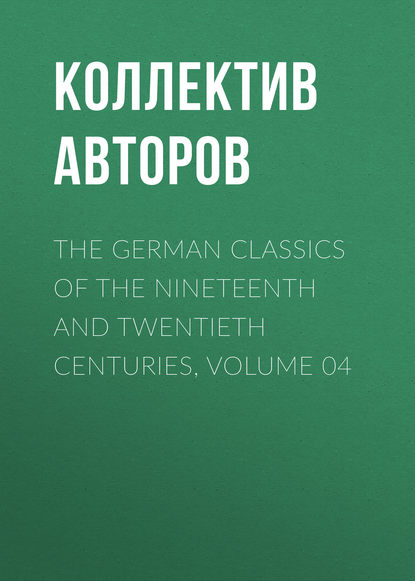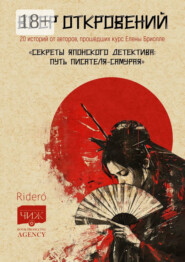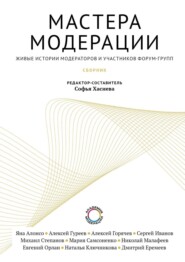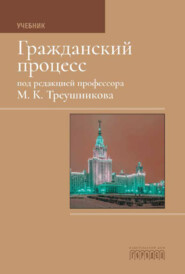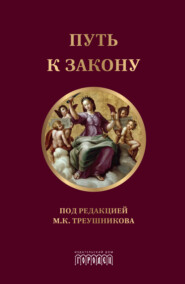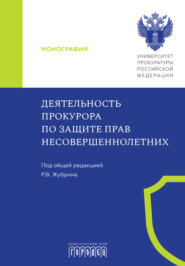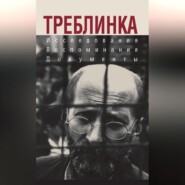По всем вопросам обращайтесь на: info@litportal.ru
(©) 2003-2024.
✖
The German Classics of the Nineteenth and Twentieth Centuries, Volume 04
Настройки чтения
Размер шрифта
Высота строк
Поля
Uniquely transfigured, the pure image of the noble Unknown shines in the blue sky of your pure soul.
JULIUS
Oh eternal longing! But surely the futile desire, the vain glare, of the day will grow dim and go out, and there will be forever more the restful feeling of a great night of love.
LUCINDA
Thus does the woman's heart in my ardent breast feel, when I am allowed to be as I am. It longs only for your longing, and is peaceful where you find peace.
DALLYINGS OF THE FANTASY
Life itself, the delicate child of the gods, is crowded out by the hard, loud preparations for living, and is pitifully stifled in the loving embrace of apelike Care.
To have purposes, to carry out purposes, to interweave purposes artfully with purposes for a purpose: this habit is so deeply rooted in the foolish nature of godlike man, that if once he wishes to move freely, without any purpose, on the inner stream of ever-flowing images and feelings, he must actually resolve to do it and make it a set purpose.
It is the acme of intelligence to keep silent from choice, to surrender the soul to the fantasy, and not to disturb the sweet dallyings of the young mother with her child. But rarely is the mind so intelligent after the golden age of its innocence. It would fain possess the soul alone; and even when she supposes herself alone with her natural love, the understanding listens furtively and substitutes for the holy child's-play mere memories of former purposes or prospects of new ones. Yes, it even continues to give to the hollow, cold illusions a tinge of color and a fleeting heat; and thus by its imitative skill it tries to steal from the innocent fantasy its very innermost being.
But the youthful soul does not allow itself to be cheated by the cunning of the prematurely old Understanding, and is always watching while its darling plays with the beautiful pictures of the beautiful world. Willingly she allows her brow to be adorned with the wreaths which the child plaits from the blossoms of life, and willingly she sinks into waking slumber, dreaming of the music of love, hearing the friendly and mysterious voices of the gods, like the separate sounds of a distant romance.
Old, well-known feelings make music from the depths of the past and the future. They touch the listening spirit but lightly, and quickly lose themselves in the background of hushed music and dim love. Every one lives and loves, complains and rejoices, in beautiful confusion. Here at a noisy feast the lips of all the joyful guests open in general song, and there the lonely maiden becomes mute in the presence of the friend in whom she would fain confide, and with smiling mouth refuses the kiss. Thoughtfully I strew flowers on the grave of the prematurely dead son, flowers which presently, full of joy and hope, I offer to the bride of the beloved brother; while the high priestess beckons to me and holds out her hand for a solemn covenant to swear by the pure eternal fire eternal purity and never-dying enthusiasm. I hasten away from the altar and the priestess to seize my sword and plunge with the host of heroes into a battle, which I soon forget, seeing in the deepest solitude only the sky and myself.
The soul that has such dreams in sleep continues to have them even when it is awake. It feels itself entwined by the blossoms of love, it takes care not to destroy the loose wreaths; it gladly gives itself up a prisoner, consecrates itself to the fantasy, and willingly allows itself to be ruled by the child, which rewards all maternal cares by its sweet playfulness.
Then a fresh breath of the bloom of youth and a halo of child-like ecstasy comes over the whole of life. The man deifies his Beloved, the mother her child, and all men everlasting humanity.
Now the soul understands the wail of the nightingale and the smile of the new-born babe; the significance of the flowers and the mysterious hieroglyphics of the starry sky; the holy import of life as well as the beautiful language of Nature. All things speak to it, and everywhere it sees the lovely spirit through the delicate envelope.
On this gaily decorated floor it glides through the light dance of life, innocent, and concerned only to follow the rhythm of sociability and friendship, and not to disturb the harmony of love. And during it all an eternal song, of which it catches now and then a few words which adumbrate still higher wonders.
Ever more beautifully this magic circle encompasses the charmed soul, and that which it forms or speaks sounds like a wonderful romance of childhood's beautiful and mysterious divinities—a romantic tale, accompanied by the bewitching music of the feelings, and adorned with the fairest flowers of lovely life.
APHORISMS
By FRIEDRICH SCHLEGEL
From the Lyceum and the Athenæum (1797-1800)
TRANSLATED BY LOUIS H. GRAY
Perfect understanding of a classic work should never be possible; but those who are cultivated and who are still striving after further culture, must always desire to learn more from it.
If an author is to be able to write well upon a theme, he must no longer feel interest in it; the thought which is to be soberly expressed must already be entirely past and must no longer personally concern the writer. So long as the artist invents and is inspired, he is in an unfavorable situation, at least for communicating his concepts. He will then wish to say everything—a false tendency of young geniuses, or an instinctively correct prejudice of old bunglers. In this way he mistakes the value and the dignity of self-restraint, although for the artist, as for the man, this is the first and the last, the most needful and the highest.
We should never appeal to the spirit of antiquity as an authority. There is this peculiarity about spirits: they cannot be grasped with the hands and be held up before others. Spirits reveal themselves only to spirits. Here, too, the briefest and most concise course would doubtless be to prove, through good works, our possession of the faith which alone gives salvation.
He who desires something infinite knows not what he desires; but the converse of this proposition is not true.
In the ordinary kind of fair or even good translation it is precisely the best part of a work that is lost.
It is impossible to offend a man if he will not be offended.
Every honest author writes for no one or for all men; he who writes that this one or that one may read him, deserves not to be read at all.
In the poetry of the Ancients we see the perfection of the letter: in that of the moderns we divine the growth of the spirit.
The Germans are said to be the foremost nation of the world as regards artistic sense and scientific genius. Very true, only—there are very few Germans.
Almost all marriages are only concubinages, morganatic wedlock, or, rather, provisional attempts and remote approximations to a real marriage, the peculiar essence of which consists in the fact that more than one person are to become but one, not in accordance with the paradoxes of this system or that, but in harmony with all spiritual and temporal laws. A fine concept, although its realization seems to have many grave difficulties. For this very reason there should here be the least possible restriction of the caprice which may well have a word to say when it becomes a question of whether one is to be an individual in himself or is to be merely an integral part of a corporate personality; nor is it easy to see what objections, on principle, could be made to a marriage a quatre. If the State, however, is determined to hold together, even by force, the unsuccessful attempts at marriage, it thereby impedes the very possibility of marriage, which might be furthered by new—and perhaps happier—attempts.
A regiment of soldiers on parade is, according to some philosophers, a system.
A man can only become a philosopher, he cannot be one; so soon as he believes that he is one, he ceases to become one.
The printed page is to thought what a nursery is to the first kiss.
The historian is a prophet looking backward.
There are people whose entire activity consists in saying "No." It would be no small thing always to be able rightly to say "No," but he who can do nothing more, surely cannot do it rightly. The taste of these negationists is an admirable shears to cleanse the extremities of genius; their enlightenment a great snuffer for the flame of enthusiasm; and their reason a mild laxative for immoderate passion and love.
Every great philosopher has always so explained his predecessors—often unintentionally—that it seemed as though they had not in the least been understood before him.
As a transitory condition skepticism is logical insurrection; as a system it is anarchy; skeptical method would thus be approximately like insurgent government.
At the phrases "his philosophy," "my philosophy," we always recall the words in Nathan the Wise: "Who owns God? What sort of a God is that who is owned by a man?"
What happens in poetry happens never or always; otherwise, it is no true poetry. We ought not to believe that it is now actually happening.
Women have absolutely no sense of art, though they may have of poetry. They have no natural disposition for the sciences, though they may have for philosophy. They are by no means wanting in power of speculation and intuitive perception of the infinite; they lack only power of abstraction, which is far more easy to be learned.
That is beautiful which is charming and sublime at the same time.
Romantic poetry is a progressive universal poetry. Its mission is not merely to reunite all the separate categories of poetry, and to bring poetry into contact with philosophy and with rhetoric. It will, and should, also now mingle and now amalgamate poetry and prose, genius and criticism, artistic poetry and natural poetry; make poetry living and social, and life and society poetic; poetize wit; and fill and saturate the forms of art with sterling material of every kind, and inspire them with the vibrations of humor. It embraces everything, if only it is poetic—from the greatest system of art which, in its turn, includes many systems within itself, down to the sigh, the kiss, which the musing child breathes forth in artless song. It can so be lost in what it represents that it might be supposed that its one and all is the characterization of poetic individuals of every type; and yet no form has thus far arisen which would be equally adapted perfectly to express the author's mind; so that many artists who desired only to write a romance have more or less described themselves. Romantic poetry alone can, like the epic, become a mirror of the entire world that surrounds it, and a picture of its age. And yet, free from all real and ideal interests, it, too, most of all, can soar, mid-way between that which is presented and him who presents, on the wings of poetic reflection; it can ever re-intensify this reflection and multiply it as in an endless series of mirrors. It is capable of the highest and of the most universal culture—not merely from within outward, but also from without inward—since it organizes similarly all parts of that which is destined to become a whole; thus the prospect of an endlessly developing classicism is opened up to it. Among the arts romantic poetry is what wit is to philosophy, and what society, association, friendship, and love are in life. Other types of poetry are finished, and can now be completely analyzed. The romantic type of poetry is still in process of development; indeed, it is its peculiar essence that it can eternally only be in process of development, and that it can never be completed. It can be exhausted by no theory, and only a divinatory criticism might dare to wish to characterize its ideal. It alone is infinite, even as it alone is free; and as its first law it recognizes that the arbitrariness of the poet brooks no superior law. The romantic style of poetry is the only one which is more than a style, and which is, as it were, poetry itself; for in a certain sense all poetry is, or should be, romantic.
In the ancients every man has found what he needed or desired—especially himself.
The French Revolution, Fichte's Wissenschaftslehre, and Goethe's Wilhelm Meister are the three greatest tendencies of the age. Whoever is offended at this juxtaposition, and whoever can deem no revolution important which is not boisterous and material, has not yet risen to the broad and lofty viewpoint of the history of mankind. Even in our meagre histories of culture, which, for the most part, resemble a collection of variant readings accompanied by a running commentary the classical text of which has perished, many a little book of which the noisy rabble took scant notice in its day, plays a greater rôle than all that this rabble did.
It is very one-sided and presumptuous to assert that there is only one Mediator. To the ideal Christian—and in this respect the unique Spinoza comes nearest to being one—everything ought to be a Mediator.
He alone can be an artist who has a religion of his own, an original view of the infinite.
It is a peculiar trait of humanity that it must exalt itself above humanity.
Plato's philosophy is a worthy preface to the religion of the future.
Man is free when he brings forth God or makes Him visible; and thereby he becomes immortal.
The morality of a book lies not in its theme or in the relation of the writer to his public, but in the spirit of the treatment. If this breathes the full abundance of humanity, it is moral. If it is merely the work of an isolated power and art, it is not moral.





